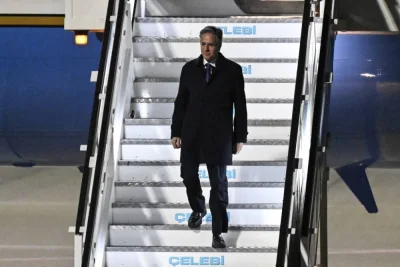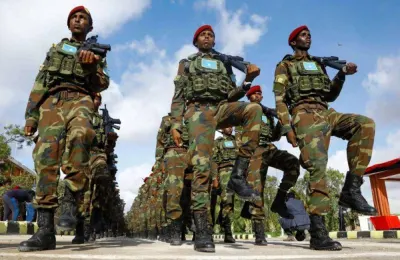
Britain’s Defence Secretary Grant Shapps delivers a speech on defending the UK and its allies, at Lancaster House, in London.
Britain will send 20,000 armed forces personnel to one of Nato’s largest exercises since the Cold War, Defence Secretary Grant Shapps announced yesterday, warning of increasing threats to the Western-led alliance.
The deployment, which Shapps characterised as the UK’s biggest to Nato in four decades, is aimed at “providing vital reassurance” over the “menace” posed by Russian President Vladimir Putin following his invasion of Ukraine, Shapps said.
The British personnel – from the Royal Air Force, Royal Navy and Army – will deploy across Europe and beyond for the military alliance’s latest “Exercise Steadfast Defender”, alongside personnel from 31 other member countries and Sweden, which is a candidate to join the transatlantic alliance. “Today’s Nato is bigger than ever but the challenges are bigger too,” Shapps said in a wide-ranging speech in London, in which he warned “the international rules-based order” was facing rising dangers.
“And that’s why the UK has committed…the totality of our air, land and maritime assets to Nato”, he went on. “In 2024 I am determined to do even more and that’s why I can announce today the UK will send in some 20,000 personnel to lead one of Nato’s largest deployments since the end of the Cold War.”
The UK contingent will include fighter jets and surveillance aircraft, the navy’s most advanced warships and submarines, and a full range of army capabilities, including special operations forces. London will send a so-called Carrier Strike Group – which features its flagship aircraft carrier and F-35B fighter jets and helicopters – to the exercises in the North Atlantic, Norwegian Sea and Baltic Sea.
Meanwhile, some 16,000 soldiers will be deployed across eastern Europe from next month to June, taking with them tanks, artillery, helicopters and parachutes.
Shapps used his most high-profile speech since being appointed to the post in August to argue that the post-Cold War “peace dividend” has ended and Western allies must face down foes including China, Iran, North Korea and Russia.
“It’s been replaced by a period of hard-headed realism,” he said, adding that Nato’s adversaries “are more connected with each other” than ever and Western allies “stand at a crossroads”. “Our adversaries are busily rebuilding their barriers, old enemies are reanimated, battle lines are being redrawn, the tanks are literally on Ukraine’s lawn and the foundations of the world order are being shaken to their core.”
Shapps also addressed the joint UK-US strikes against Houthi rebels in Yemen last week. The Houthis have repeatedly attacked shipping in the Red Sea in recent months, in protest at the war in Gaza.
The UK minister said the strikes were intended “as a single action”. But asked if further military action was planned, he replied: “I can’t predict the future for you.” “We will not put up with a major waterway … being closed on a permanent basis” to international shipping, Shapps added.
The deployment, which Shapps characterised as the UK’s biggest to Nato in four decades, is aimed at “providing vital reassurance” over the “menace” posed by Russian President Vladimir Putin following his invasion of Ukraine, Shapps said.
The British personnel – from the Royal Air Force, Royal Navy and Army – will deploy across Europe and beyond for the military alliance’s latest “Exercise Steadfast Defender”, alongside personnel from 31 other member countries and Sweden, which is a candidate to join the transatlantic alliance. “Today’s Nato is bigger than ever but the challenges are bigger too,” Shapps said in a wide-ranging speech in London, in which he warned “the international rules-based order” was facing rising dangers.
“And that’s why the UK has committed…the totality of our air, land and maritime assets to Nato”, he went on. “In 2024 I am determined to do even more and that’s why I can announce today the UK will send in some 20,000 personnel to lead one of Nato’s largest deployments since the end of the Cold War.”
The UK contingent will include fighter jets and surveillance aircraft, the navy’s most advanced warships and submarines, and a full range of army capabilities, including special operations forces. London will send a so-called Carrier Strike Group – which features its flagship aircraft carrier and F-35B fighter jets and helicopters – to the exercises in the North Atlantic, Norwegian Sea and Baltic Sea.
Meanwhile, some 16,000 soldiers will be deployed across eastern Europe from next month to June, taking with them tanks, artillery, helicopters and parachutes.
Shapps used his most high-profile speech since being appointed to the post in August to argue that the post-Cold War “peace dividend” has ended and Western allies must face down foes including China, Iran, North Korea and Russia.
“It’s been replaced by a period of hard-headed realism,” he said, adding that Nato’s adversaries “are more connected with each other” than ever and Western allies “stand at a crossroads”. “Our adversaries are busily rebuilding their barriers, old enemies are reanimated, battle lines are being redrawn, the tanks are literally on Ukraine’s lawn and the foundations of the world order are being shaken to their core.”
Shapps also addressed the joint UK-US strikes against Houthi rebels in Yemen last week. The Houthis have repeatedly attacked shipping in the Red Sea in recent months, in protest at the war in Gaza.
The UK minister said the strikes were intended “as a single action”. But asked if further military action was planned, he replied: “I can’t predict the future for you.” “We will not put up with a major waterway … being closed on a permanent basis” to international shipping, Shapps added.
Source link
 Kokani.me Kokani.me
Kokani.me Kokani.me



